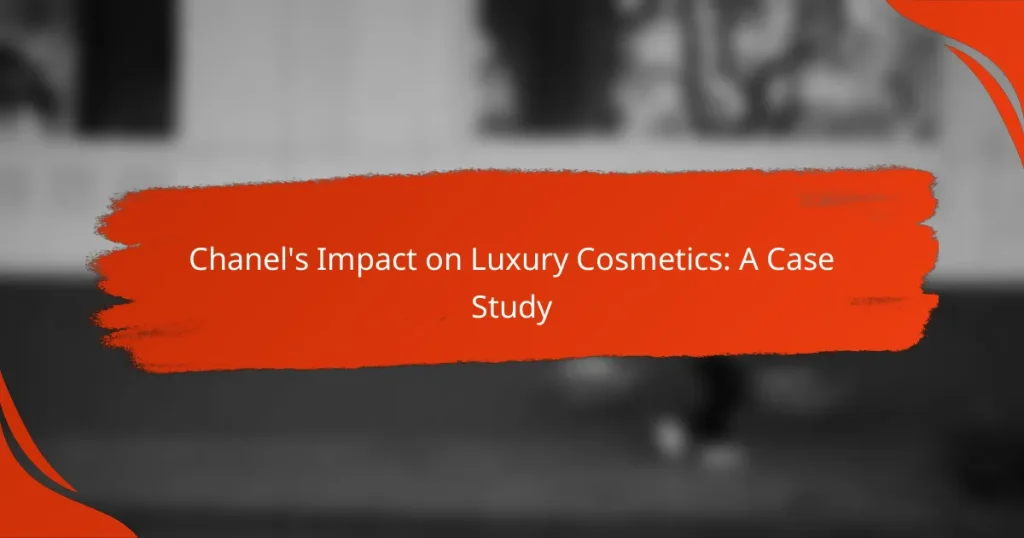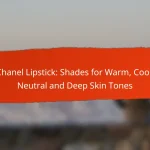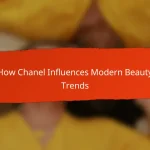Chanel has profoundly influenced the luxury cosmetics market in Europe, establishing a brand that epitomizes elegance and quality. Through innovative product development and strategic marketing, Chanel has set industry benchmarks that shape consumer expectations and redefine luxury standards.
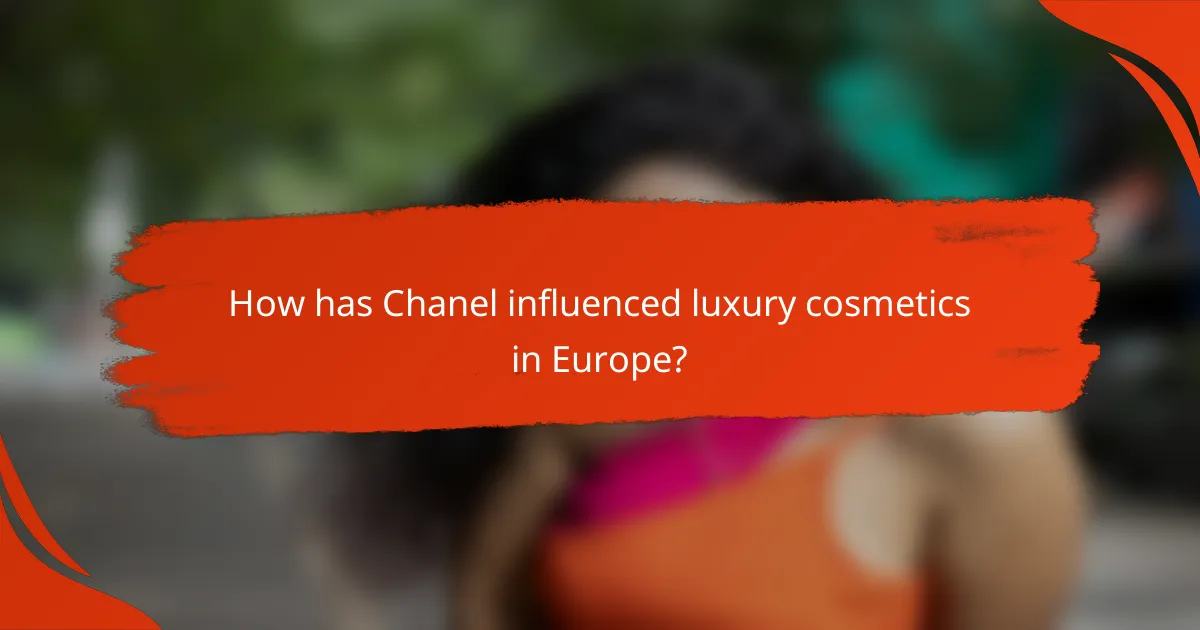
How has Chanel influenced luxury cosmetics in Europe?
Chanel has significantly shaped the luxury cosmetics landscape in Europe by establishing a brand synonymous with elegance and quality. Its innovative approaches in product development, marketing, and consumer engagement have set benchmarks for the industry.
Brand positioning and prestige
Chanel’s brand positioning emphasizes exclusivity and sophistication, which resonates deeply with luxury consumers. By maintaining high price points and limited product availability, Chanel cultivates a sense of prestige that attracts affluent buyers.
The brand’s iconic status is further reinforced through its heritage and the timeless appeal of its products, making it a leader in the luxury cosmetics sector across Europe.
Innovative product launches
Chanel is known for its innovative product launches that often set trends in the beauty industry. The introduction of products like the Chanel No. 5 Eau de Parfum and the Rouge Coco lipstick line showcases the brand’s commitment to quality and creativity.
These launches not only capture consumer attention but also establish new standards for formulation and packaging, influencing competitors to elevate their offerings.
Marketing strategies in major cities
Chanel employs targeted marketing strategies in major European cities such as Paris, London, and Milan. The brand often utilizes high-profile fashion shows and exclusive events to create buzz around new launches, ensuring that its products are front and center in luxury markets.
Additionally, Chanel’s presence in prestigious department stores and boutiques enhances its visibility and reinforces its luxury image, attracting discerning customers.
Collaborations with influencers
Chanel has effectively collaborated with influencers and celebrities to amplify its reach and appeal. By partnering with well-known figures in fashion and beauty, the brand taps into their audiences, creating authentic connections with potential customers.
These collaborations often feature exclusive product lines or limited editions, generating excitement and urgency among consumers, which drives sales.
Consumer perception and loyalty
Chanel has cultivated a strong consumer perception centered around luxury, quality, and heritage. This perception fosters deep brand loyalty, with many customers viewing Chanel products as essential investments in their beauty routines.
To maintain this loyalty, Chanel focuses on customer experience, ensuring that every interaction, from purchase to post-sale service, reflects the brand’s high standards.

What are Chanel’s key product innovations?
Chanel’s key product innovations have significantly shaped the luxury cosmetics industry, introducing iconic products that blend elegance with functionality. Their focus on quality, timeless design, and innovative formulations has set industry standards and influenced consumer expectations.
Chanel No. 5 fragrance
Launched in 1921, Chanel No. 5 is one of the most famous fragrances in the world, known for its complex blend of floral and aldehyde notes. This fragrance revolutionized the perfume industry by introducing a synthetic component that enhanced longevity and depth, making it a staple in luxury cosmetics.
The iconic bottle design, with its minimalist aesthetic, also reflects Chanel’s commitment to elegance and simplicity. Its marketing strategy, including celebrity endorsements and cultural references, has solidified its status as a timeless classic.
Chanel Rouge Coco lipstick
Chanel Rouge Coco lipstick, introduced in 2010, combines rich color with hydrating properties, setting a new standard for luxury lip products. The formula includes nourishing ingredients like jojoba oil and mimics the natural moisture of lips, offering both comfort and vibrant color.
This product is available in a wide range of shades, catering to diverse skin tones and preferences. Its sleek packaging and signature branding enhance its appeal, making it a must-have in any luxury cosmetics collection.
Chanel Les Beiges collection
The Chanel Les Beiges collection, launched in 2013, emphasizes a natural, radiant look, appealing to consumers seeking a more understated beauty approach. This line includes lightweight foundations, bronzers, and powders that enhance the skin’s natural texture without heavy coverage.
With a focus on skincare benefits, many products in the Les Beiges collection incorporate SPF and moisturizing agents, aligning with modern beauty trends that prioritize skin health. The collection’s versatile shades and easy application make it suitable for everyday use, attracting a broad audience.

How does Chanel’s pricing strategy affect market dynamics?
Chanel’s pricing strategy significantly influences market dynamics by positioning its products as luxury items, which creates a perception of exclusivity and desirability. This approach not only attracts affluent consumers but also sets a benchmark for competitors in the luxury cosmetics sector.
Premium pricing model
Chanel employs a premium pricing model, which involves setting prices higher than average market rates. This strategy reinforces the brand’s luxury image and appeals to consumers who associate higher prices with superior quality and prestige.
By maintaining this pricing structure, Chanel can invest in high-quality ingredients and innovative product development, further enhancing its brand reputation. This model also allows for higher profit margins, which can be reinvested into marketing and brand positioning.
Comparison with competitors like Dior
When compared to competitors like Dior, Chanel’s pricing strategy often reflects a similar premium approach, although Chanel tends to maintain slightly higher price points for certain products. This differentiation can be attributed to Chanel’s strong brand heritage and iconic status in the luxury market.
For instance, while both brands offer high-end skincare and makeup, Chanel’s signature products, such as its No. 5 fragrance, command a unique price premium that reinforces its market leadership. This strategic pricing helps both brands compete effectively while appealing to their respective target audiences.
Impact on consumer buying behavior
Chanel’s pricing strategy significantly impacts consumer buying behavior by creating a sense of urgency and exclusivity. High prices often lead consumers to perceive Chanel products as more desirable, prompting quicker purchasing decisions among affluent buyers.
Additionally, the luxury pricing model fosters brand loyalty, as consumers are more likely to invest in products that they perceive as exclusive. This behavior is evident in the cosmetics market, where consumers often seek out Chanel products as status symbols, reinforcing the brand’s position in the luxury segment.

What marketing strategies does Chanel employ?
Chanel employs a mix of traditional and modern marketing strategies to maintain its status in the luxury cosmetics market. These strategies include celebrity endorsements, social media campaigns, and sponsorship of high-profile events, all aimed at enhancing brand visibility and desirability.
Celebrity endorsements
Chanel frequently collaborates with high-profile celebrities to promote its products, leveraging their influence to reach a broader audience. These endorsements often feature well-known figures in advertising campaigns, showcasing the luxury and exclusivity associated with the brand.
For example, Chanel has partnered with stars like Kristen Stewart and Margot Robbie, who embody the brand’s image and appeal to its target demographic. Such collaborations not only enhance brand prestige but also create a sense of aspiration among consumers.
Social media campaigns
Chanel utilizes social media platforms to engage with its audience and promote its products creatively. The brand shares visually stunning content that highlights its cosmetics, often using hashtags to encourage user interaction and participation.
Campaigns on platforms like Instagram and TikTok allow Chanel to connect with younger consumers, showcasing makeup tutorials and behind-the-scenes content. This strategy helps to foster a community around the brand, driving both awareness and sales.
Luxury event sponsorships
Chanel sponsors various luxury events, including fashion weeks and film festivals, to reinforce its image as a leader in the luxury market. These sponsorships provide opportunities for the brand to showcase its products in an exclusive setting, attracting high-net-worth individuals and influencers.
By aligning itself with prestigious events, Chanel not only enhances its brand visibility but also creates memorable experiences for attendees, further solidifying its reputation in the luxury cosmetics industry.
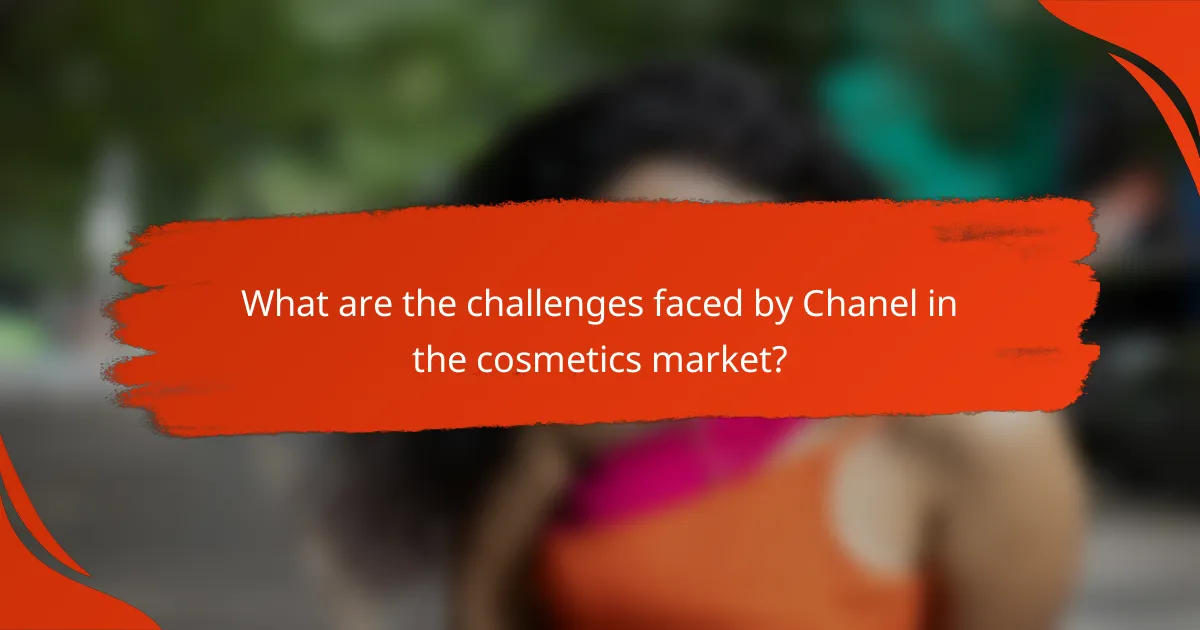
What are the challenges faced by Chanel in the cosmetics market?
Chanel faces several significant challenges in the cosmetics market, including counterfeit products, changing consumer preferences, and sustainability concerns. These issues impact brand integrity, customer loyalty, and compliance with evolving market demands.
Counterfeit products
Counterfeit products pose a major threat to Chanel’s brand reputation and revenue. These fake items often flood the market at lower prices, misleading consumers and undermining the perceived value of authentic Chanel cosmetics.
To combat counterfeiting, Chanel invests in advanced anti-counterfeiting technologies and legal actions against infringers. Educating consumers about how to identify genuine products is also crucial in maintaining brand integrity.
Changing consumer preferences
Consumer preferences in the cosmetics industry are rapidly evolving, influenced by trends such as clean beauty and inclusivity. Chanel must adapt its product offerings to meet the demands of a more diverse and environmentally conscious customer base.
Staying ahead of these trends requires continuous market research and innovation. For example, introducing vegan formulations or expanding shade ranges can help Chanel appeal to a broader audience and retain existing customers.
Sustainability concerns
Sustainability is an increasingly important factor for consumers when choosing cosmetics. Chanel faces pressure to adopt eco-friendly practices in sourcing, production, and packaging to align with consumer values.
Implementing sustainable practices can involve investing in renewable materials, reducing waste, and ensuring ethical sourcing of ingredients. By transparently communicating these efforts, Chanel can enhance its reputation and attract environmentally conscious consumers.
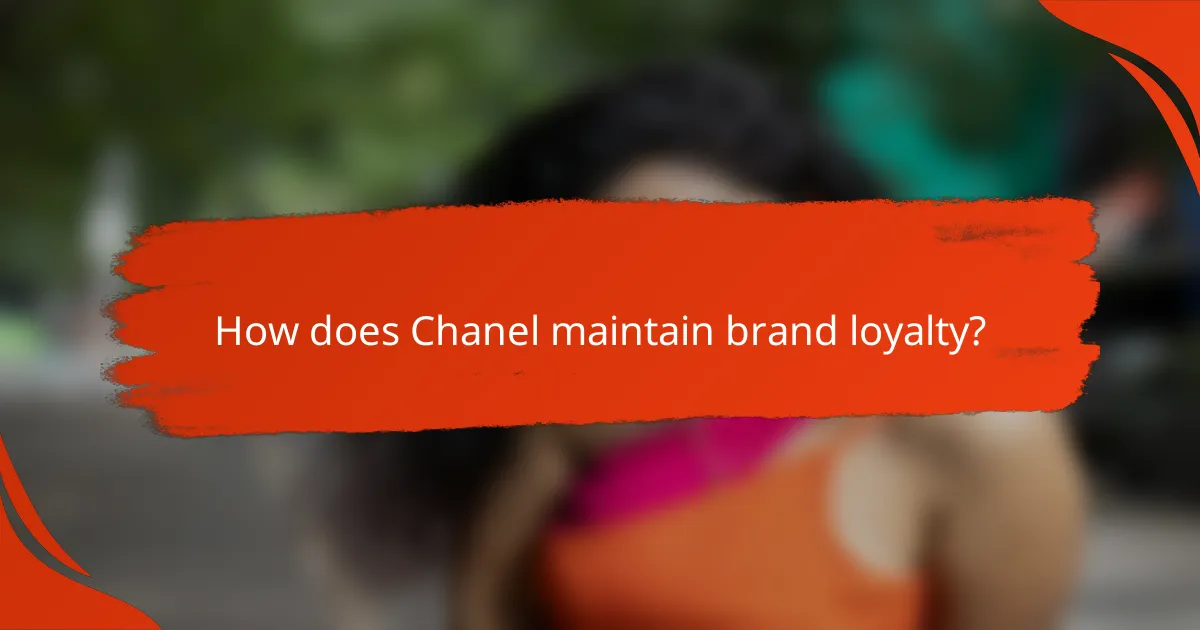
How does Chanel maintain brand loyalty?
Chanel maintains brand loyalty through a combination of exclusivity, high-quality products, and personalized customer experiences. By creating a strong emotional connection with consumers, Chanel ensures that customers remain dedicated to the brand over time.
Exclusive membership programs
Chanel’s exclusive membership programs are designed to reward loyal customers with unique benefits. These programs often include early access to new product launches, invitations to private events, and personalized consultations, enhancing the overall customer experience.
Members typically receive tailored communications and offers that cater to their preferences, fostering a sense of belonging and appreciation. This personalized approach not only strengthens brand loyalty but also encourages repeat purchases.
To maximize the effectiveness of such programs, brands should focus on creating meaningful rewards that resonate with their target audience. For instance, offering limited-edition products or exclusive experiences can significantly enhance customer engagement and satisfaction.
